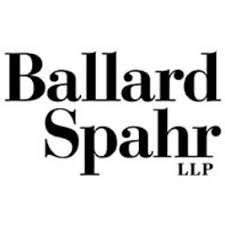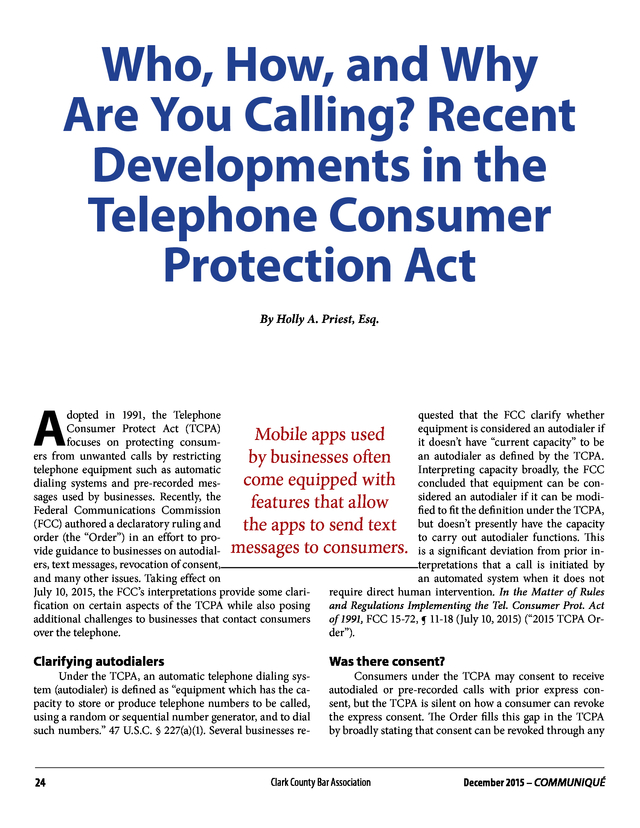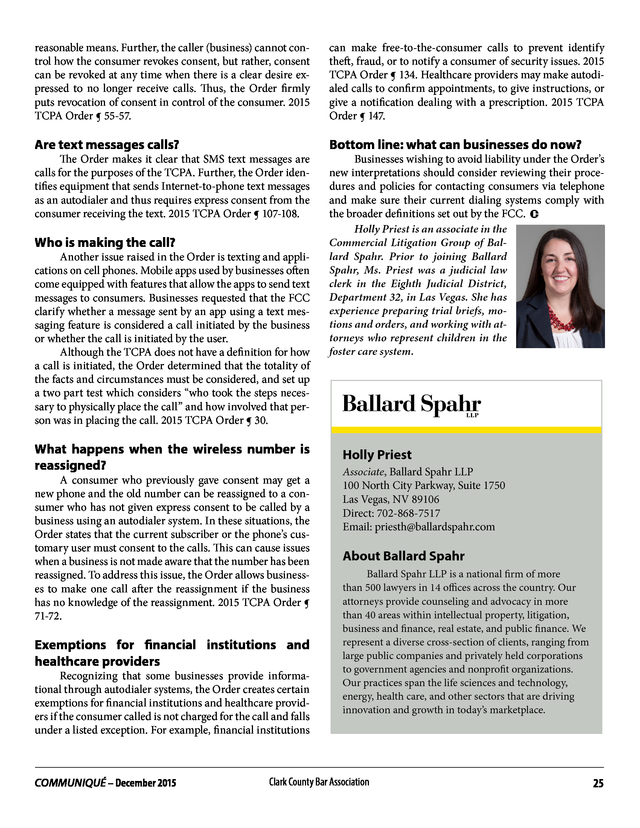Who, How, and Why Are You Calling? Recent Developments in the Telephone Consumer Protection Act – December 1, 2015
BallardSpahr
Description
Who, How, and Why
Are You Calling? Recent
Developments in the
Telephone Consumer
Protection Act
By Holly A. Priest, Esq.
A
dopted in 1991, the Telephone
Consumer Protect Act (TCPA)
focuses on protecting consumers from unwanted calls by restricting
telephone equipment such as automatic
dialing systems and pre-recorded messages used by businesses. Recently, the
Federal Communications Commission
(FCC) authored a declaratory ruling and
order (the “Order”) in an effort to provide guidance to businesses on autodialers, text messages, revocation of consent,
and many other issues. Taking effect on
July 10, 2015, the FCC’s interpretations provide some clarification on certain aspects of the TCPA while also posing
additional challenges to businesses that contact consumers
over the telephone.
quested that the FCC clarify whether
equipment is considered an autodialer if
it doesn’t have “current capacity” to be
an autodialer as defined by the TCPA.
Interpreting capacity broadly, the FCC
concluded that equipment can be considered an autodialer if it can be modified to fit the definition under the TCPA,
but doesn’t presently have the capacity
to carry out autodialer functions.
This is a significant deviation from prior interpretations that a call is initiated by an automated system when it does not require direct human intervention. In the Matter of Rules and Regulations Implementing the Tel. Consumer Prot.
Act of 1991, FCC 15-72, ¶ 11-18 (July 10, 2015) (“2015 TCPA Order”). Clarifying autodialers Was there consent? Mobile apps used by businesses often come equipped with features that allow the apps to send text messages to consumers. Under the TCPA, an automatic telephone dialing system (autodialer) is defined as “equipment which has the capacity to store or produce telephone numbers to be called, using a random or sequential number generator, and to dial such numbers.” 47 U.S.C. § 227(a)(1). Several businesses re- 24 Consumers under the TCPA may consent to receive autodialed or pre-recorded calls with prior express consent, but the TCPA is silent on how a consumer can revoke the express consent.
The Order fills this gap in the TCPA by broadly stating that consent can be revoked through any Clark County Bar Association December 2015 – COMMUNIQUÉ . reasonable means. Further, the caller (business) cannot control how the consumer revokes consent, but rather, consent can be revoked at any time when there is a clear desire expressed to no longer receive calls. Thus, the Order firmly puts revocation of consent in control of the consumer. 2015 TCPA Order ¶ 55-57. can make free-to-the-consumer calls to prevent identify theft, fraud, or to notify a consumer of security issues.
2015 TCPA Order ¶ 134. Healthcare providers may make autodialed calls to confirm appointments, to give instructions, or give a notification dealing with a prescription. 2015 TCPA Order ¶ 147. Are text messages calls? Bottom line: what can businesses do now? The Order makes it clear that SMS text messages are calls for the purposes of the TCPA.
Further, the Order identifies equipment that sends Internet-to-phone text messages as an autodialer and thus requires express consent from the consumer receiving the text. 2015 TCPA Order ¶ 107-108. Who is making the call? Another issue raised in the Order is texting and applications on cell phones. Mobile apps used by businesses often come equipped with features that allow the apps to send text messages to consumers.
Businesses requested that the FCC clarify whether a message sent by an app using a text messaging feature is considered a call initiated by the business or whether the call is initiated by the user. Although the TCPA does not have a definition for how a call is initiated, the Order determined that the totality of the facts and circumstances must be considered, and set up a two part test which considers “who took the steps necessary to physically place the call” and how involved that person was in placing the call. 2015 TCPA Order ¶ 30. What happens when the wireless number is reassigned? A consumer who previously gave consent may get a new phone and the old number can be reassigned to a consumer who has not given express consent to be called by a business using an autodialer system. In these situations, the Order states that the current subscriber or the phone’s customary user must consent to the calls.
This can cause issues when a business is not made aware that the number has been reassigned. To address this issue, the Order allows businesses to make one call after the reassignment if the business has no knowledge of the reassignment. 2015 TCPA Order ¶ 71-72. Exemptions for financial institutions and healthcare providers Recognizing that some businesses provide informational through autodialer systems, the Order creates certain exemptions for financial institutions and healthcare providers if the consumer called is not charged for the call and falls under a listed exception.
For example, financial institutions COMMUNIQUÉ – December 2015 Businesses wishing to avoid liability under the Order’s new interpretations should consider reviewing their procedures and policies for contacting consumers via telephone and make sure their current dialing systems comply with the broader definitions set out by the FCC. Holly Priest is an associate in the Commercial Litigation Group of Ballard Spahr. Prior to joining Ballard Spahr, Ms. Priest was a judicial law clerk in the Eighth Judicial District, Department 32, in Las Vegas.
She has experience preparing trial briefs, motions and orders, and working with attorneys who represent children in the foster care system. Holly Priest Associate, Ballard Spahr LLP 100 North City Parkway, Suite 1750 Las Vegas, NV 89106 Direct: 702-868-7517 Email: priesth@ballardspahr.com About Ballard Spahr Ballard firm of more JUDGESpahr LLP is a national the country. Our JACKIE GLASS, RET. than 500 lawyers in 14 offices across attorneys provide counseling and advocacy in more IS AVAILABLE FOR than 40 areas within intellectual property, litigation, business and finance, real estate, and public AND We MEDIATIONS, ARBITRATIONS finance. represent a PRIVATE OR MOCK clients, ranging from diverse cross-section of TRIALS large public companies and privately held corporations AT to government agencies and nonprofit organizations. Our practices span the life sciences and technology, energy, health care, and other sectors that are driving 702 932 2600 innovation and growth in today’s marketplace. Clark County Bar Association PRIVATE TRIALS jglass@privatetrials.com 25 .
This is a significant deviation from prior interpretations that a call is initiated by an automated system when it does not require direct human intervention. In the Matter of Rules and Regulations Implementing the Tel. Consumer Prot.
Act of 1991, FCC 15-72, ¶ 11-18 (July 10, 2015) (“2015 TCPA Order”). Clarifying autodialers Was there consent? Mobile apps used by businesses often come equipped with features that allow the apps to send text messages to consumers. Under the TCPA, an automatic telephone dialing system (autodialer) is defined as “equipment which has the capacity to store or produce telephone numbers to be called, using a random or sequential number generator, and to dial such numbers.” 47 U.S.C. § 227(a)(1). Several businesses re- 24 Consumers under the TCPA may consent to receive autodialed or pre-recorded calls with prior express consent, but the TCPA is silent on how a consumer can revoke the express consent.
The Order fills this gap in the TCPA by broadly stating that consent can be revoked through any Clark County Bar Association December 2015 – COMMUNIQUÉ . reasonable means. Further, the caller (business) cannot control how the consumer revokes consent, but rather, consent can be revoked at any time when there is a clear desire expressed to no longer receive calls. Thus, the Order firmly puts revocation of consent in control of the consumer. 2015 TCPA Order ¶ 55-57. can make free-to-the-consumer calls to prevent identify theft, fraud, or to notify a consumer of security issues.
2015 TCPA Order ¶ 134. Healthcare providers may make autodialed calls to confirm appointments, to give instructions, or give a notification dealing with a prescription. 2015 TCPA Order ¶ 147. Are text messages calls? Bottom line: what can businesses do now? The Order makes it clear that SMS text messages are calls for the purposes of the TCPA.
Further, the Order identifies equipment that sends Internet-to-phone text messages as an autodialer and thus requires express consent from the consumer receiving the text. 2015 TCPA Order ¶ 107-108. Who is making the call? Another issue raised in the Order is texting and applications on cell phones. Mobile apps used by businesses often come equipped with features that allow the apps to send text messages to consumers.
Businesses requested that the FCC clarify whether a message sent by an app using a text messaging feature is considered a call initiated by the business or whether the call is initiated by the user. Although the TCPA does not have a definition for how a call is initiated, the Order determined that the totality of the facts and circumstances must be considered, and set up a two part test which considers “who took the steps necessary to physically place the call” and how involved that person was in placing the call. 2015 TCPA Order ¶ 30. What happens when the wireless number is reassigned? A consumer who previously gave consent may get a new phone and the old number can be reassigned to a consumer who has not given express consent to be called by a business using an autodialer system. In these situations, the Order states that the current subscriber or the phone’s customary user must consent to the calls.
This can cause issues when a business is not made aware that the number has been reassigned. To address this issue, the Order allows businesses to make one call after the reassignment if the business has no knowledge of the reassignment. 2015 TCPA Order ¶ 71-72. Exemptions for financial institutions and healthcare providers Recognizing that some businesses provide informational through autodialer systems, the Order creates certain exemptions for financial institutions and healthcare providers if the consumer called is not charged for the call and falls under a listed exception.
For example, financial institutions COMMUNIQUÉ – December 2015 Businesses wishing to avoid liability under the Order’s new interpretations should consider reviewing their procedures and policies for contacting consumers via telephone and make sure their current dialing systems comply with the broader definitions set out by the FCC. Holly Priest is an associate in the Commercial Litigation Group of Ballard Spahr. Prior to joining Ballard Spahr, Ms. Priest was a judicial law clerk in the Eighth Judicial District, Department 32, in Las Vegas.
She has experience preparing trial briefs, motions and orders, and working with attorneys who represent children in the foster care system. Holly Priest Associate, Ballard Spahr LLP 100 North City Parkway, Suite 1750 Las Vegas, NV 89106 Direct: 702-868-7517 Email: priesth@ballardspahr.com About Ballard Spahr Ballard firm of more JUDGESpahr LLP is a national the country. Our JACKIE GLASS, RET. than 500 lawyers in 14 offices across attorneys provide counseling and advocacy in more IS AVAILABLE FOR than 40 areas within intellectual property, litigation, business and finance, real estate, and public AND We MEDIATIONS, ARBITRATIONS finance. represent a PRIVATE OR MOCK clients, ranging from diverse cross-section of TRIALS large public companies and privately held corporations AT to government agencies and nonprofit organizations. Our practices span the life sciences and technology, energy, health care, and other sectors that are driving 702 932 2600 innovation and growth in today’s marketplace. Clark County Bar Association PRIVATE TRIALS jglass@privatetrials.com 25 .













